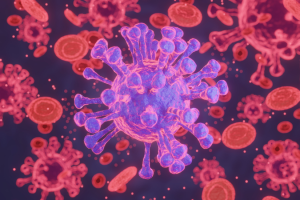A damage in the inner lining of the heart chambers and heart valves usually caused by a bacteria, fungi or other germs from another part of the body that spread through the bloodstream and attach to damaged areas in your heart. It is uncommon to people with healthy hearts, while those with damaged heart valves, artificial heart valves or other heart defects are of greater risks.

Symptoms of endocarditis are not always severe, and they may develop slowly over time. In the early stages of endocarditis, the symptoms are similar to many other illnesses. This is why many cases go undiagnosed. Many of the symptoms are similar to cases of the flu or general infections, such as pneumonia. However, some people experience severe symptoms that appear suddenly, such as: swollen feet, shortness of breath, blood in the urine or an enlarged spleen, which may be tender to touch. These symptoms may be due to inflammation or the damage it causes.
Endocarditis occurs when there is an overgrowth of bacteria. Although these bacteria normally live on the outside of your body, you might bring them inside by eating or drinking, or through cuts in your skin. Your immune system normally fights off germs before they cause a problem. However, this process fails in some people. In the case of endocarditis, the germs travel through your bloodstream and into your heart, where they multiply and cause inflammation. Endocarditis can also be caused by fungi or other germs, and in some cases, there’s no known cause. Eating and drinking are not the only ways that germs can enter your body. They can also get into your bloodstream through:
- Brushing your teeth
- Having poor oral hygiene or gum disease Contracting a sexually transmitted disease
- Wearing a catheter
- Having a dental procedure that cuts your gums
If your endocarditis is caused by bacteria, it will be treated by antibiotics, and this will normally takes six weeks. If your infection is advanced, you may receive these antibiotics through and IV until you show signs of improvement. If the valves are damaged or there are signs of emboli (spreading of the bacteria from the valves to other body parts i.e. brain), then surgical removal of the damaged valves is necessary.
Having good oral hygiene and keeping regular dental appointments can eliminate some of the harmful bacteria that can build up in your mouth. This reduces your risk of developing endocarditis from swallowing these bacteria.
If you’ve undergone a dental treatment that was followed up with antibiotics, make sure to take your antibiotics as directed. If you have a history of heart disease, heart surgery, or endocarditis, be on the watch for the signs and symptoms of endocarditis. Pay special attention to a persistent fever and unexplained fatigue. Contact your doctor as soon as possible if you have any of these symptoms.

Dr Julian K.B. Tan
Dr Julian Tan is a physician and cardiologist at Mount Elizabeth Hospital. He is proficient in all aspects of interventional cardiology, including complex bifurcation and CTO interventions.
Whilst at Tan Tock Seng Hospital, he was the Principal Investigator and co-investigator of many multinational and landmark clinical trials. With numerous publications in peer-reviewed journals, he has been invited to lecture in regional and international cardiology conferences.
He is also a Clinical Senior Lecturer at the Yong Loo Lin School
of Medicine, NUS; a Core Clinical Faculty Member at the NHG Cardiology Senior Residency Program; and a Clinical Teacher at the Lee Kong Chian School of Medicine.










